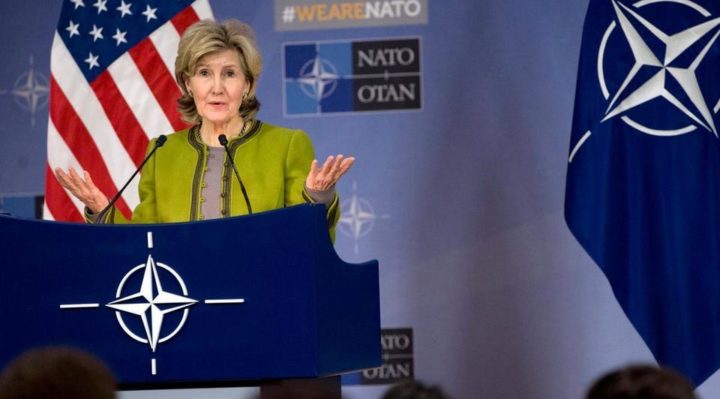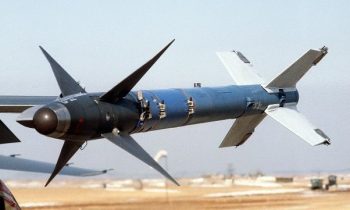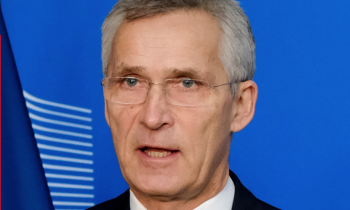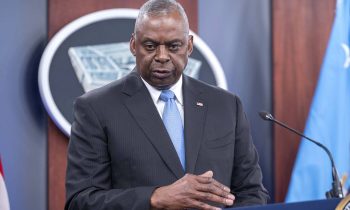The exact number of US troops that will be withdrawn from Germany is yet to be determined, nothing has been “set in concrete,” US Permanent Representative to NATO Kay Bailey Hutchison said on Tuesday.
The exact number of US troops that will be withdrawn from Germany is yet to be determined, nothing has been “set in concrete,” US Permanent Representative to NATO Kay Bailey Hutchison said on Tuesday.
Late on Monday, US President Donald Trump said that the US would reduce the number of its troops in Germany to 25,000 from the current 34,500, in connection with Germany’s debt owed to NATO and US dissatisfaction with bilateral trade relations.
“Germany is a strong partner and has been a hub for our military for a long time, and I don’t think that we have any kind of timeline that I have heard of.
So I really think that much is in the phase of being looked at, but nothing firm has been set … It will take some time to plan, I think, for the defense department for any potential troop movement, but I don’t think anything has been set in concrete yet,” Hutchinson said at a briefing.
Trump has tasked the US military with assessing the US “force structure in Europe” and looking at where it would be best to relocate the troops, Hutchinson added.

Below is a full rush transcript of the Press Briefing by Ambassador Kay Bailey Hutchison U.S. Permanent Representative to the North Atlantic Treaty Organization (NATO).
Ambassador Hutchison: I’m really happy to be with you as my usual tradition is to have a press briefing before a ministerial. And even though the ministerial is virtual, I’m really glad to be able to talk to the press today about what we’re going to do because, in fact, this is going to be a very productive defense ministerial.
I think that we’re down to nuts and bolts of making sure that we have the concept for deterrence and defense of our entire alliance. And that is something that I think the ministers will hear about and hopefully endorse tomorrow. We also are going to talk about COVID-19, and our allies have been so helpful to each other in COVID-19. And NATO has been a transporter of 250 flights’ worth of the needed capabilities and equipment that our allies and partners have asked for during this time when, really, our nations have come together to fight this dreadful virus that is bringing our economies down, and which we all hope to fight together and beat together.
And then we’re also going to talk about the Russian missile defense buildup. We have gotten, from our Supreme Allied Commander of NATO, an assessment of what Russia has been doing. We know they have violated the INF treaty, and it turns out that they have continued to do that and built up quite an arsenal of weaponry that NATO needs to assess and be willing to deter and defend, which of course we are.
And I think it’s going to be a very productive time. Although our ministers really enjoy being together in person, they will exchange information for sure virtually tomorrow and the next day. And we hope that that will lead to another defense ministerial in person in the fall if we can all start traveling again, as we hope to do.
Question : Is the future of aspirant countries, particularly Georgia, on the agenda of this defense ministerial meeting? Could you please assess Georgia’s efforts as a partner country?
Ambassador Hutchison: We have had an open door, and as everyone knows, we have recently accepted North Macedonia into our midst. And we’ve also adopted Ukraine as an Enhanced Opportunity Partner, which Georgia already is. And what that means is that we are giving special attention and more interoperable efforts with Georgia and Ukraine and consider them our closest partners. We think that both of those countries are standing up to Russian aggression; Russia has tried to illegally take over parts of Georgia and parts of Ukraine. NATO has stood firmly for the sovereignty of those two countries, and we will continue to do so.
Question: My question is about recent information about the possible withdrawal of U.S. troops from Germany. Will it be discussed with your partners in the ministerial? And do you know any details? Can you make us familiar with what will be this withdrawal in the future or if anything concrete there?
Ambassador Hutchison: We do know that the President said yesterday that there would be a draw-down from Germany. He has, as far as we know, tasked the military to assess our force structure in Europe and to look at where it would best serve the deterrence and defense for all of Europe to have those troops. So, I think we know that much.
Going forward, I think it is really important that we look at the big picture in Europe and the commitment of the United States in Europe, which has increased, not decreased. It has most certainly decreased in the European Defense Initiative, where we have put thousands more troops into Poland as well as the enhanced forward presence in which we participate for the Baltics. We have troops that are throughout Europe, and we’ll continue to have a troop presence in Europe. I don’t think there will be a diminution of America’s commitment to Europe at all. I think it is stronger than ever.
Question: Are you going to talk about Turkish and Russian interventions in Libya at the ministerial meeting? What is the U.S. position?
Ambassador Hutchison: I think that there will be conversation, of course, among our allies on the situation in Libya, and the United States has taken the position that there should be peace talks between the warring factions in Libya. We are certainly against the Russian presence in both Syria as well as Libya. They have been disruptive in both places. They have even attacked Turkey’s troops in Syria.
So, it’s a very disruptive situation. Russia is certainly having a hand in that. And that is a discussion because, of course, in the alliance we are trying very hard – and I don’t think there will be a NATO issue in Libya, but we’re trying hard to say to both sides: it is time for the UN envoy to bring the parties together and try to have a peaceful situation there. And we certainly hope that Russia will look at what they’re doing and become a force for peace rather than the disruptive force that they have been for years in Syria and now Libya.
Question: Madam Ambassador, again on the troop reduction from Germany, the President, when he made his announcement yesterday, did not say in which time frame this was meant to go ahead, and also, he did not mention whether he considers to move these troops to Poland. So, could you please update us on these issues? When are we likely to see the draw-down? And if I may ask, in addition to that, the President also said or hinted at the fact that if Germany paid more, he might review his decision. So in the end, are we still in a kind of bargaining phase?
Ambassador Hutchison: Well, I think any kind of actual planning, I think, has not happened yet. I know that the military is looking at the force structure, and where troops can do the most good. And, of course, Germany is a strong partner and has been a hub for our military for a long time. And I don’t think that we have any kind of timeline that I have heard of. So, I really think that much is in the phase of being looked at, but nothing firm has been set.
I think, when you talk about the German payments, it is clear that Germany needs to do more on the defense side. They say that themselves. Their defense ministers, both before and now, Minister Karrenbauer, have said they need to do more in defense spending, and so has Chancellor Merkel. So, I think that they are working toward that. They’ve increased their spending very much, 80 percent, over the last few years. So, they are beginning to make those commitments on spending.
And I think that it is important that we have the forces that are showing the commitment that America has in Europe, and that there will be much more to come. It will take some time to plan, I think, for the Defense Department for any potential troop movement. But I don’t think anything has been set in concrete yet.
Question: On Friday, June 12th, Ukraine was recognized as a NATO Enhanced Opportunity Partner, or EOP. In your opinion, is that a last step before getting a Membership Action Plan, or was that some kind of substitute for real membership in the alliance?
Ambassador Hutchison: It is saying that the Ukraine people are very much important to NATO, that we are going to have more interoperability, more training, more exercises. I think that there is no question that both the U.S. but also NATO is committed to the sovereignty of the Ukraine. And Russia is continuing to produce much malign influence in the eastern part of Ukraine as well as their illegal invasion of Crimea, which is also part of Ukraine.
So, we stand with the Ukraine people. But this is not anything in a beginning of a MAP, and it is not anything that is saying that Ukraine would never be an ally in NATO. I hope they will be. The U.S. hopes they will be. And when the time is right, then accession and MAP plans will be on the drawing boards. We are very supportive of Ukraine.
Question: Is there any implications on U.S. strategy towards Baltic defense because of the Turkish decision to block implementation of NATO’s defense plan for the Baltics? Does the U.S. have any idea how to solve the situation with Turkey and Baltic defense plans?
Ambassador Hutchison: Well, we certainly have much interest in the graduated response plans for the Baltics and Poland, and they will be achieved. We are very, very committed, of course, to the enhanced forward presence of the Baltics, and the European defense initiative in Poland, as well as the enhance forward presence there. And the planning is going forward for the Baltics, and I hope that we are very close to having that finalized in the very few hours or days ahead.
Question: I wanted to know more on the troop pullout from Germany. What sort of strategic thinking was behind this? Since I’ve spoken to military officials, and nobody seems to think that this is a good idea, considering how many operations the U.S. does that use the troops stationed in Germany but aren’t actually being used for territorial defense of Europe. Do you have any – do you have idea what’s behind that, and also why there was not more consultation done before President Trump made his announcement when Secretary General Stoltenberg was – said that these were only media reports a few days ago?
Ambassador Hutchison: Every time we’ve had one of our in-person press conferences you’ve been there, and we appreciate that. I don’t – I can’t say any more than that the troop assessment for Europe has been certainly tasked to the military for a long time, just looking at where the troops are and where they need to be. I do not disagree that Germany has been a good partner – a good partner in housing our troops; our troops like being there – but I also know that there are many rotating troops that are in Germany, but in other places as well.
So, I don’t know all of the details of what went into that particular announcement, but I do think that there will be more information coming out, and I think that it should not be thought that there is any walking away from Europe and Germany. Germany is in all of our NATO missions. They are key partners in Afghanistan, in Iraq, in Kosovo, in enhanced forward presence. They are with us in NATO. They know they need to do more in defense spending. Their defense ministers have said so, Chancellor Merkel has said so, and I think they’re working on that, and I think they are purchasing more equipment to prepare for the future. They are meeting their capability targets.
So there is a balance there, and I think there is a general view in Congress and in the administration and the President to recognize the things that Germany does, but to call on them to do more, as they themselves have said they intend to do.
Question: We are at a massive military escalation in Asia with Chinese militarization of disputed islands and provocations against Taiwan, Japan, and India. Would you say there’s a risk for actual military confrontation on the horizon? And what is NATO’s role to maintain stability in the Asian region?
Ambassador Hutchison: Well, that’s a very interesting question, because I think NATO is now looking to the East, and I think the provocations that are mentioned in that question – in the South China Sea, what’s happening in Hong Kong, what’s happening with our 5G networks that we’re dealing with in the United States and in Europe, throughout our alliance, trying to keep our communications secure and seeing that some of the Chinese competitors do not have the capability to control the contractual obligations that are made by communications providers – all of those things, including the Belt and Road Initiative, are raising concerns, concerns among our allies, about what is the intent of China. What are they doing that would appear to not be peaceful, that would not be players on a level playing field?
So, we and our NATO allies are looking at that, we’re assessing. The United States is very clear that we want China to be a partner in the world order that would be required for ethical behavior. And we know that China has stolen intellectual property, that they have violated tariff and subsidies that have been set down by the world courts and the World Trade Organization.
So we know that China has the capability to compete on a level playing field, and we’re asking them to do that, but we’re also turning a wary eye to their behavior right now in the South China Sea, militarizing islands that they said would never be done, as well as the clampdown on Hong Kong where they have an agreement with Hong Kong that was made when the agreement was made with the UK to allow Hong Kong to go its way.
But those agreements are being disputed and violated, so I think China could be a peaceful partner, a good trade partner, but they’re not showing that right now, and I think NATO partners – not NATO itself, but NATO partners are looking at this, and NATO is beginning to assess what China is doing as well. It’s much more on our radar screen, and I think it should be because we should assess risk, hope for the best, but prepare for the worst.
Question: The defense ministers are going to adopt a package of measures to counter Russian nuclear-capable missiles. What will be the measures taken by the U.S.? Will the U.S. develop new anti-missile defenses or deploy new installations in Europe?
Ambassador Hutchison: Well, most certainly America is looking at the Russian missile buildup. The reports that come back are very troubling, and we know that we need to prepare for a much bigger arsenal and a much more capable arsenal than we have seen in the past from Russia. So yes, the U.S. is looking at the ways that we would deter, and NATO is also going to be looking at what should be a deterrence in Europe. And, of course, we don’t have the plans for that set yet. We are in talks with Russia, hopefully with China as well, on nuclear missile capability and hopefully the containment of nuclear capabilities by all three countries – U.S., Russia, and China – but also we are looking at ways to guard both ourselves, the U.S., as well as Europe, in what Russia might be doing that could be harmful for the peace in Europe.
And when you say “Will there be capabilities in Europe?” anything that’s done in Europe would be with the permission of the countries where there would be a deterrence, or there could be movable, mobile deterrences, or it could be water-bound deterrences. So, there could be many ways to deter Russia. I don’t think there’s been anything clearly decided at this point either by the United States or by our European allies.
Ambassador Hutchison: Well, thank you for holding this press conference, and I certainly appreciate the interest that our international partners and allies have in NATO. I think NATO is as strong and unified as it has ever been, and we intend to keep it that way.



